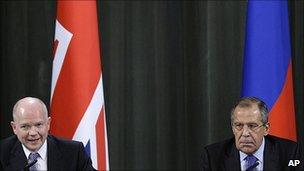Hague and Lavrov call for closer UK-Russian ties
- Published

Mr Hague and Mr Lavrov said they wanted more businesslike relations between the two countries
William Hague has said he wants closer economic and security ties with Russia despite unresolved differences over the murder of Alexander Litvinenko.
On his first trip to Russia as UK foreign secretary, Mr Hague said the killing of the former spy in London in 2006 remained a "big problem".
Russia has rejected an extradition request for the main suspect.
But Russian foreign minister Sergei Lavrov said the case should not be an obstacle to improved co-operation.
Relations between the two countries deteriorated markedly after the poisoning of Mr Litvinenko with the radioactive substance polonium-210 and have still not fully recovered.
UK investigators suspect former KGB agent Andrei Lugovoi of the murder and their 2007 request for his extradition to stand trial in the UK still stands.
'Differences remain'
Russia has refused to accede to this, saying it would be against its constitution to do so.
At a press conference, Mr Hague and Mr Lavrov acknowledged that they had discussed the Litvinenko case but had not come to any settlement.
"Our countries have had some serious differences in the past," Mr Hague - who also met Russian President Dmitry Medvedev and Russian human rights activists on Wednesday - said.
"We should be able to acknowledge that differences remain and apply our minds to them, patiently, through dialogue and diplomacy."
Earlier Mr Hague said the case "remains a major problem in bilateral relations and I don't think that problem is going to go away".
Mr Lavrov said Russia was willing to co-operate with the UK regarding the case but only in accordance with its own laws.
'Not acceptable'
Mr Lugovoi told the BBC's Russian service that the police had not produced any evidence that he was involved in Mr Litvinenko's death, which he said was a "horrific crime".
"I am a Russian citizen, so why should I comply with the British law?" he said.
"What prevents the British system from sending its documents and evidence over here? No, because there is nothing."
Mr Lugovoi, who is a member of the lower house of the Russian Parliament, accused the UK of trying to "destroy his reputation".
"I am not going to Great Britain. To justify myself. No, this is not acceptable."
Russia also has outstanding extradition requests which Britain has turned down, including for tycoon Boris Berezovsky and Chechen separatist Akhmed Zakayev.
Small step
Despite these difficulties, both foreign ministers said there was scope for more productive relations between the two countries across a range of areas.
Mr Lavrov, who has accepted an invitation to visit London, said he did not view "the remaining problems as an obstacle for other issues".
For his part, Mr Hague said he wanted to further develop trade links and joint efforts to tackle drug and people trafficking and cyber crime.
"Clearly there is a lot of progress that we can make in the economic area and the knowledge partnership that we talked about."
BBC diplomatic correspondent Bridget Kendall said the visit represented a small step in improving relations between the countries rather than a completely fresh start.
The two foreign ministers are also thought to have discussed Afghanistan, Iran's nuclear programme, and the Middle East peace process.
- Published14 October 2010
- Published15 September 2010